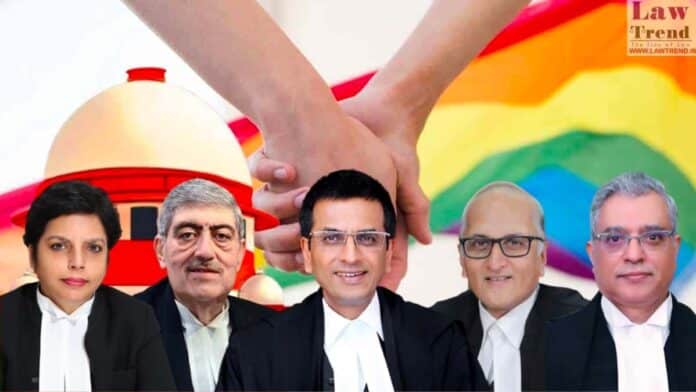Following are the highlights of the judgement pronounced by a five-judge constitution bench of the Supreme Court which on Tuesday unanimously refused to accord legal recognition to same-sex marriage:
* CJI D Y Chandrachud and Justice Sanjay Kishan Kaul, in their two separate judgements, concurred on almost all the legal questions related to same-sex marriage.
* However, Justices S Ravindra Bhat, Hima Kohli and P S Narasimha differed on certain aspects, including applicability of adoption regulations to queer couples.

* Justice Bhat, in the judgement he wrote for himself and Justice Kohli, said there is no unqualified right to marriage except those that are recognised by statute.
* An entitlement to legal recognition of the right to union akin to marriage or civil union, or conferring legal status upon the parties to the relationship can be only through enacted law.
* The challenge to the Special Marriage Act (SMA) on the ground of under classification is not made out.
* The Centre shall set up a high-powered committee chaired by the Union Cabinet Secretary to undertake a comprehensive examination of all factors relevant to queer community and consider benefits for them.
* Transgender persons in heterosexual relationships have the freedom and entitlement to marry under the existing statutory provisions.
* CJI Chandrachud in his separate judgement said Constitution does not expressly recognise a fundamental right to marry.
* Queerness is a natural phenomenon known to India since ancient times. It is not urban or elite.
* There is no universal conception of the institution of marriage, nor is it static.
Marriage has attained significance as a legal institution largely because of regulation by the state.
* The freedom of all persons including queer couples to enter into a union is protected by Part III of the Constitution.
* Apex court cannot either strike down the constitutional validity of SMA or read words into the SMA because of its institutional limitations.
* The right to enter into a union cannot be restricted based on sexual orientation.
Transgender persons in heterosexual relationships have the right to marry under existing law including personal laws which regulate marriage.
* The state must enable the LGBTQ community to exercise its rights under the Constitution.
* CJI says unmarried couples (including queer couples) can jointly adopt a child.
* “Regulation 5(3) of the CARA (Central Adoption Resource Authority) regulations cannot be held void on the grounds urged,” says Justice Bhat, striking a note different from Justice Chandrachud.
* The Union government, state governments, and governments of Union Territories shall not discriminate against the freedom of queer persons to enter into union with benefits under law.
* The Union government, state governments, and governments of Union Territories to ensure that the queer community is not discriminated against because of their gender identity or sexual orientation.







